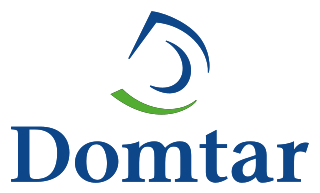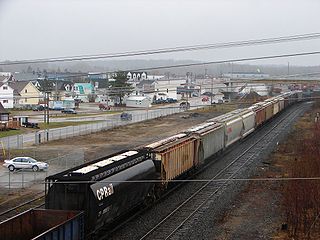
Pulp is a fibrous lignocellulosic material prepared by chemically, semi-chemically or mechanically producing cellulosic fibers from wood, fiber crops, waste paper, or rags. Mixed with water and other chemicals or plant-based additives, pulp is the major raw material used in papermaking and the industrial production of other paper products.

The pulp and paper industry comprises companies that use wood, specifically pulpwood, as raw material and produce pulp, paper, paperboard, and other cellulose-based products.
Boise Cascade Company is an American manufacturer of wood products and wholesale distributor of building materials, headquartered in Boise, Idaho.

Abitibi Consolidated Inc. was a Canadian pulp and paper company based in Montreal, Quebec. Abitibi-Consolidated was formed from the merger of Abitibi-Price Inc. and Stone Consolidated Corp. on May 29, 1997; the Company merged with Bowater in 2007 to form AbitibiBowater.

Domtar Corporation is a North American pulp and paper company that manufactures and markets wood fiber-based pulp and paper products. The company operates pulp mills and paper mills in Windsor, Quebec; Dryden, Ontario; Kamloops, British Columbia; Ashdown, Arkansas; Hawesville, Kentucky; Plymouth, North Carolina; Marlboro County, South Carolina; and Kingsport, Tennessee. While Domtar operated independently for several decades and was listed on the Toronto and New York stock exchanges, the company was acquired by Paper Excellence Group in November 2021 and has since operated as a subsidiary.

Nackawic is a former town in New Brunswick, Canada. It held town status prior to 2023 and is now part of the rural community of Nackawic-Millville. It is approximately 65 km west of the city of Fredericton on the east bank of the Saint John River.

Cascades Inc. is a Canadian company that produces, converts, and markets packaging and tissue products composed mainly of recycled fibres. Cascades employs more than 11,700 people in more than 85 operating units in North America. It was founded in 1964.

Chapleau is a township in Sudbury District, Ontario, Canada. It is home to one of the world's largest wildlife preserves. Chapleau has a population of 1,942 according to the 2016 Canadian census.
The E. B. Eddy Company was a Canadian pulp and paper company, now a division of Domtar Inc. At the time of the purchase, the company had facilities in Hull, Quebec, Timmins, Ontario, Espanola, Ontario, Chapleau, Ontario, Pembroke, Ontario, Sault Ste. Marie, Ontario, Delta, British Columbia and Port Huron, Michigan.
The Canadian International Paper Company (CIP) was a Montreal-based forest products company, a former subsidiary of International Paper. It was originally formed as the St. Maurice Lumber Company in 1919 but was renamed in 1925. It was sold to Canadian Pacific Forest Products in the early 1980s, which became Avenor Inc. in 1994; this company was then bought by Bowater in 1998.

Témiscaming is a city located at the south end of Lac Témiscamingue on the upper Ottawa River in the Témiscamingue Regional County Municipality of western Quebec, Canada. Also nearby is Lake Kipawa.

Rayonier Inc, headquartered in Wildlight, Florida, is a timberland real estate investment trust ("REIT") with assets located in some of the most productive softwood timber growing regions in the United States and New Zealand. Its core business segments are timber and real estate.
Woodfibre, originally Britannia West, was a pulp mill and at one time a small company town, on the west side of upper Howe Sound near Squamish, British Columbia. The mill closed in March 2006.

Nine Dragons Paper (Holdings) Limited, operating as ND Paper in the United States is a publicly listed paper manufacturing company in Mainland China, engaging in the manufacturing of containerboard products which include linerboard, duplex board as well as pulp. Its CEO and largest shareholder is Mrs. Zhang Yin.
The Forest Products Association of Canada (FPAC) is a trade association which represents Canada's wood, pulp and paper producers both nationally and internationally in government, trade, and environmental affairs. Canada's forest products industry is an $80 billion a year industry that represents 2% of Canada's GDP.
Kruger Inc. is a Canadian private company which manufactures publication papers, tissue, lumber and other wood products, corrugated cartons from recycled fibres, green and renewable energy, and wines and spirits. Kruger Inc. operates facilities in Québec, Ontario, British Columbia, Newfoundland and Labrador, and the United States.

The environmental effects of paper are significant, which has led to changes in industry and behaviour at both business and personal levels. With the use of modern technology such as the printing press and the highly mechanized harvesting of wood, disposable paper became a relatively cheap commodity, which led to a high level of consumption and waste. The rise in global environmental issues such as air and water pollution, climate change, overflowing landfills and clearcutting have all lead to increased government regulations. There is now a trend towards sustainability in the pulp and paper industry as it moves to reduce clear cutting, water use, greenhouse gas emissions, fossil fuel consumption and clean up its influence on local water supplies and air pollution.
Clearwater Paper Corporation is a pulp and paper product manufacturer that was created on December 9, 2008, via a spin-off from the real estate investment trust (REIT) company Potlatch Corporation. With its headquarters in Spokane, Washington, the new company started with four locations for the manufacture of bleached paperboard, consumer tissue, and wood products.
Value-added wood products in Ontario are the result of combining commodity level products and innovation. Essentially, producing value-added wood products means taking raw materials and turning it into something useful. For example: engineered wood, millwork, cabinets, furniture, tongue depressors or popsicle sticks. Additional processing of a commodity wood product by manufacturers creates a specialty product whose value is more than the original product. These value-added products become part of the secondary sector of our economy.
RYAM is an American chemical company specializing in cellulose-based products. Headquartered in Jacksonville, Florida, it produces more than 25 grades of high-purity performance fibers for products ranging from food, cosmetics, and pharmaceuticals to paints, filters, impact-resistant plastics, and digital display screens. In 2014, Rayonier and Rayonier Advanced Materials split into separate companies. Rayonier retained the real estate and forest resource components while RYAM took over management of the performance fibers division.












